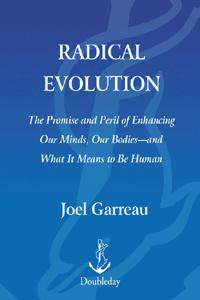Joel Garreau - Radical Evolution: The Promise and Peril of Enhancing Our Minds, Our Bodies--and what it Means to be Human
Here you can read online Joel Garreau - Radical Evolution: The Promise and Peril of Enhancing Our Minds, Our Bodies--and what it Means to be Human full text of the book (entire story) in english for free. Download pdf and epub, get meaning, cover and reviews about this ebook. City: New York, year: 2006, publisher: Doubleday, genre: Art. Description of the work, (preface) as well as reviews are available. Best literature library LitArk.com created for fans of good reading and offers a wide selection of genres:
Romance novel
Science fiction
Adventure
Detective
Science
History
Home and family
Prose
Art
Politics
Computer
Non-fiction
Religion
Business
Children
Humor
Choose a favorite category and find really read worthwhile books. Enjoy immersion in the world of imagination, feel the emotions of the characters or learn something new for yourself, make an fascinating discovery.
- Book:Radical Evolution: The Promise and Peril of Enhancing Our Minds, Our Bodies--and what it Means to be Human
- Author:
- Publisher:Doubleday
- Genre:
- Year:2006
- City:New York
- Rating:4 / 5
- Favourites:Add to favourites
- Your mark:
- 80
- 1
- 2
- 3
- 4
- 5
Radical Evolution: The Promise and Peril of Enhancing Our Minds, Our Bodies--and what it Means to be Human: summary, description and annotation
We offer to read an annotation, description, summary or preface (depends on what the author of the book "Radical Evolution: The Promise and Peril of Enhancing Our Minds, Our Bodies--and what it Means to be Human" wrote himself). If you haven't found the necessary information about the book — write in the comments, we will try to find it.
Joel Garreau: author's other books
Who wrote Radical Evolution: The Promise and Peril of Enhancing Our Minds, Our Bodies--and what it Means to be Human? Find out the surname, the name of the author of the book and a list of all author's works by series.
Radical Evolution: The Promise and Peril of Enhancing Our Minds, Our Bodies--and what it Means to be Human — read online for free the complete book (whole text) full work
Below is the text of the book, divided by pages. System saving the place of the last page read, allows you to conveniently read the book "Radical Evolution: The Promise and Peril of Enhancing Our Minds, Our Bodies--and what it Means to be Human" online for free, without having to search again every time where you left off. Put a bookmark, and you can go to the page where you finished reading at any time.
Font size:
Interval:
Bookmark:


Contents
To Roland and Gloria Garreau, who got me through the past,
Simone and Evangeline, who are guiding me into the future,
and Adrienne, who helps me survive the present.

CHAPTER ONE
Prologue
The Future of Human Nature
Confusion is a word we have invented for an order which is not understood.
Henry Miller, Tropic of Capricorn
T HIS BOOK CAN T BEGIN with the tale of the telekinetic monkey.
That certainly comes as a surprise. After all, how often does someone writing nonfiction get to lead with a monkey who can move objects with her thoughts?
If you lunge at this opportunity, however, the story comes out all wrong. It sounds like science fiction, for one thing, even though the monkeya cute little critter named Belleis completely real and scampering at Duke University.
This gulf between what engineers are actually creating today and what ordinary readers might find believable is significant. It is the first challenge to making sense of this world unfolding before us, in which we face the biggest change in tens of thousands of years in what it means to be human.
This book aims at letting a general audience in on the vast changes that right now are reshaping our selves, our children and our relationships. Helping people recognize new patterns in their lives, however, is no small trick, as Ive discovered over time.
For example, theres the problem you encounter when asking people what theyd do if offered the chance to live for a very long time150 years or more. Nine out of 10 boggle at this thought. Many actually recoil. You press on. Engineers are working on ways to allow you to spend all that time with great physical vitalityperhaps even comparable to that of todays 35-year-olds. How would you react if that opportunity came to market? Theres a question that gets people thinking, but you can tell it is still quite a stretch.
We live in remarkable times. Who could have imagined at the end of the 20th century that a human augmentation substance that does what Viagra does would sponsor the NBC Nightly News?
Discussing this sort of change, however, can be hard. Take the United States Department of Defense program to create the metabolically dominant soldier. In one small part of that agenda, researchers hope to allow warriors to run at Olympic sprint speeds for 15 minutes on one breath of air. It might be indisputably true that human bodies process oxygen with great inefficiency, and this may be a solvable problem, and your taxpayer dollars unquestionably are being spent trying to remedy this oversight on the part of evolution. Nonetheless, it takes effort to hold some readers with this report. It just sounds too weird.
One fine spring evening, I found myself at a little table outside a San Francisco laundry, pondering how to bridge this divide between the real and the credible. The laundry, called Star Wash, is on a lovely but quite ordinary street. In the window there is an American flag and a sign that tastefully spells out God Bless America in red, white and blue lights. It is run by a woman named Olga, from Guatemala City. I was traveling, interviewing the people who are creating the vastly enhanced human abilities that Radical Evolution discusses, and was waiting for my shirts to be finished.
Most of the prospective readers of this book, it occurred to me, are probably like Olga. They dont care about gee-whiz technology. Why should they? Neither do I, truth be told.
What they care about is what it means to be human, what it means to have relationships, what it means to live life, to have loves, or to tell lies. If you want to engage such people, you have to tell a story about culture and valueswho we are, how we got that way, where were headed and what makes us tick. Thats what has always interested me; its what my reporting has always been about. The gee-whiz technology is just a window through which to gaze upon human nature.

F OUR INTERRELATED, intertwining technologies are cranking up to modify human nature. Call them the GRIN technologiesthe genetic, robotic, information and nano processes. These four advances are intermingling and feeding on one another, and they are collectively creating a curve of change unlike anything we humans have ever seen.
Already, enhanced people walk among us. You can see it most clearly wherever you find the keenest competition. Sport is a good example. The current doping agony, says John Hoberman, a University of Texas authority on performance drugs, is a kind of very confused referendum on the future of human enhancement. Extreme pharmacological sport did not begin or end with East Germany. Some athletes today look grotesque. Curt Schilling, the All-Star pitcher, in 2002 talked to Sports Illustrated about the major leagues. Guys out there look like Mr. Potato Head, with a head and arms and six or seven body parts that just dont look right. Competitive bodybuilding is already divided into tested shows (i.e., drug free) versus untested shows (anything goes).Thats merely the beginning. Scientists at the University of Pennsylvania who created genetically modified mighty mice have been deluged by calls from athletes and coaches who want to try this technology themselves. These mice are shockingly large and muscular. They are built like steers, with massive haunches and necks wider than their heads. Could such gene doping work in humansassuming it isnt already? Oh yeah, its easy, H. Lee Sweeney, chairman of Penns Department of Physiology, told The New York Times. Anyone who can clone a gene and work with cells could do it. Its not a mystery.... You could change the endurance of the muscle or modulate the speedall the performance characteristics. All the biology is there. If someone said, Heres $10 millionI want you to do everything you can think of in terms of sports, you could get pretty imaginative.
Then theres the military. Remember the comic-book superheroes of the 1930s and 1940s, from Superman to Wonder Woman? Most of their superpowers right now either exist or are in engineering. If you can watch a car chase in Afghanistan with a Predator, youve effectively got telescopic vision. If you can figure out whats inside a cave by peering into the earth with a seismic ground pinger, youve got X-ray vision. Want super strength? At the University of California at Berkeley, the U.S. Army has got a functioning prototype exoskeleton suit that allows a soldier to carry 180 pounds as if it were only 4.4 pounds. At Natick Labs in Massachusetts, the U.S. Army imagines that such an exoskeleton suit may ultimately allow soldiers to leap tall buildings with a single bound.
My thesis is that in just 20 years the boundary between fantasy and reality will be rent asunder, writes Rodney Brooks, director of the Artificial Intelligence Laboratory at the Massachusetts Institute of Technology. Just five years from now that boundary will be breached in ways that are as unimaginable to most people today as daily use of the World Wide Web was 10 years ago.
Font size:
Interval:
Bookmark:
Similar books «Radical Evolution: The Promise and Peril of Enhancing Our Minds, Our Bodies--and what it Means to be Human»
Look at similar books to Radical Evolution: The Promise and Peril of Enhancing Our Minds, Our Bodies--and what it Means to be Human. We have selected literature similar in name and meaning in the hope of providing readers with more options to find new, interesting, not yet read works.
Discussion, reviews of the book Radical Evolution: The Promise and Peril of Enhancing Our Minds, Our Bodies--and what it Means to be Human and just readers' own opinions. Leave your comments, write what you think about the work, its meaning or the main characters. Specify what exactly you liked and what you didn't like, and why you think so.




